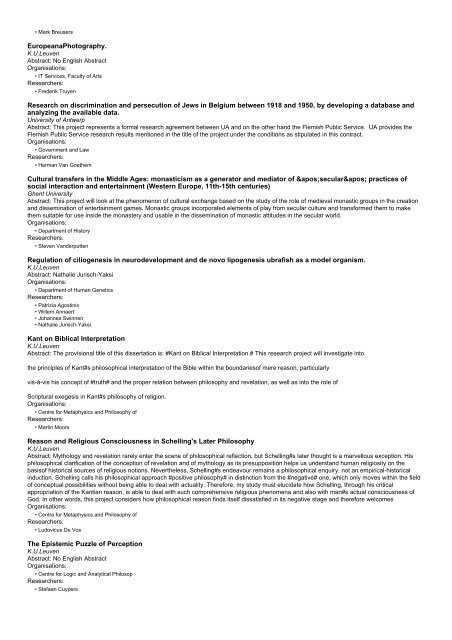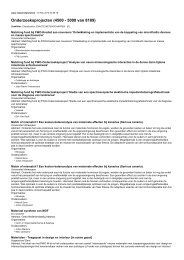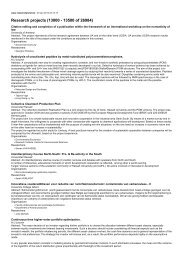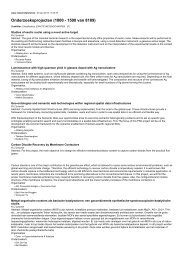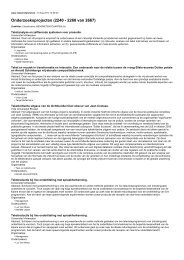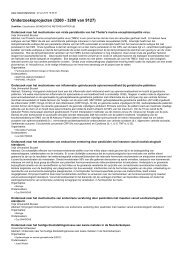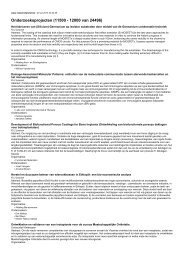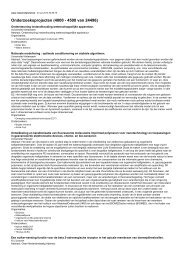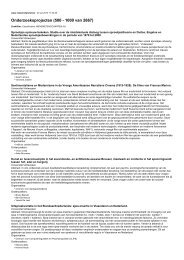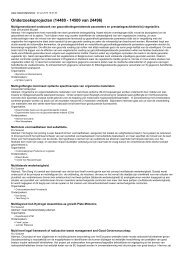Research projects (1 - 500 of 2917)
Research projects (1 - 500 of 2917)
Research projects (1 - 500 of 2917)
You also want an ePaper? Increase the reach of your titles
YUMPU automatically turns print PDFs into web optimized ePapers that Google loves.
• Mark Breusers<br />
EuropeanaPhotography.<br />
K.U.Leuven<br />
Abstract: No English Abstract<br />
Organisations:<br />
• IT Services, Faculty <strong>of</strong> Arts<br />
<strong>Research</strong>ers:<br />
• Frederik Truyen<br />
<strong>Research</strong> on discrimination and persecution <strong>of</strong> Jews in Belgium between 1918 and 1950, by developing a database and<br />
analyzing the available data.<br />
University <strong>of</strong> Antwerp<br />
Abstract: This project represents a formal research agreement between UA and on the other hand the Flemish Public Service. UA provides the<br />
Flemish Public Service research results mentioned in the title <strong>of</strong> the project under the conditions as stipulated in this contract.<br />
Organisations:<br />
• Government and Law<br />
<strong>Research</strong>ers:<br />
• Herman Van Goethem<br />
Cultural transfers in the Middle Ages: monasticism as a generator and mediator <strong>of</strong> 'secular' practices <strong>of</strong><br />
social interaction and entertainment (Western Europe, 11th-15th centuries)<br />
Ghent University<br />
Abstract: This project will look at the phenomenon <strong>of</strong> cultural exchange based on the study <strong>of</strong> the role <strong>of</strong> medieval monastic groups in the creation<br />
and dissemination <strong>of</strong> entertainment games. Monastic groups incorporated elements <strong>of</strong> play from secular culture and transformed them to make<br />
them suitable for use inside the monastery and usable in the dissemination <strong>of</strong> monastic attitudes in the secular world.<br />
Organisations:<br />
• Department <strong>of</strong> History<br />
<strong>Research</strong>ers:<br />
• Steven Vanderputten<br />
Regulation <strong>of</strong> ciliogenesis in neurodevelopment and de novo lipogenesis ubrafish as a model organism.<br />
K.U.Leuven<br />
Abstract: Nathalie Jurisch-Yaksi<br />
Organisations:<br />
• Department <strong>of</strong> Human Genetics<br />
<strong>Research</strong>ers:<br />
• Patrizia Agostinis<br />
• Willem Annaert<br />
• Johannes Swinnen<br />
• Nathalie Jurisch-Yaksi<br />
Kant on Biblical Interpretation<br />
K.U.Leuven<br />
Abstract: The provisional title <strong>of</strong> this dissertation is: #Kant on Biblical Interpretation.# This research project will investigate into<br />
the principles <strong>of</strong> Kant#s philosophical interpretation <strong>of</strong> the Bible within the boundaries<strong>of</strong> mere reason, particularly<br />
vis-à-vis his concept <strong>of</strong> #truth# and the proper relation between philosophy and revelation, as well as into the role <strong>of</strong><br />
Scriptural exegesis in Kant#s philosophy <strong>of</strong> religion.<br />
Organisations:<br />
• Centre for Metaphysics and Philosophy <strong>of</strong><br />
<strong>Research</strong>ers:<br />
• Martin Moors<br />
Reason and Religious Consciousness in Schelling's Later Philosophy<br />
K.U.Leuven<br />
Abstract: Mythology and revelation rarely enter the scene <strong>of</strong> philosophical reflection, but Schelling#s later thought is a marvellous exception. His<br />
philosophical clarification <strong>of</strong> the conception <strong>of</strong> revelation and <strong>of</strong> mythology as its presupposition helps us understand human religiosity on the<br />
basis<strong>of</strong> historical sources <strong>of</strong> religious notions. Nevertheless, Schelling#s endeavour remains a philosophical enquiry, not an empirical-historical<br />
induction. Schelling calls his philosophical approach #positive philosophy# in distinction from the #negative# one, which only moves within the field<br />
<strong>of</strong> conceptual possibilities without being able to deal with actuality. Therefore, my study must elucidate how Schelling, through his critical<br />
appropriation <strong>of</strong> the Kantian reason, is able to deal with such comprehensive religious phenomena and also with man#s actual consciousness <strong>of</strong><br />
God. In other words, this project considers how philosophical reason finds itself dissatisfied in its negative stage and therefore welcomes<br />
Organisations:<br />
• Centre for Metaphysics and Philosophy <strong>of</strong><br />
<strong>Research</strong>ers:<br />
• Ludovicus De Vos<br />
The Epistemic Puzzle <strong>of</strong> Perception<br />
K.U.Leuven<br />
Abstract: No English Abstract<br />
Organisations:<br />
• Centre for Logic and Analytical Philosop<br />
<strong>Research</strong>ers:<br />
• Stefaan Cuypers


